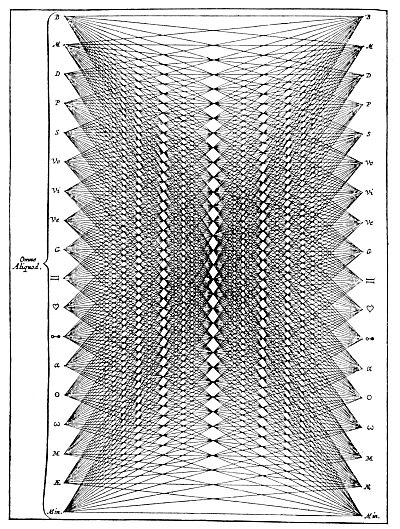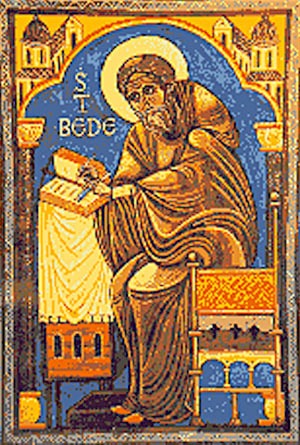After the death of Plato, his disciples separated into two groups. One, the Academics, continued to meet in the Academy where once he had presided; the other, the Peripatetics, removed to the Lyceum under the leadership of Aristotle (384-322 B.C.). Plato recognized Aristotle as his greatest disciple and, according to Philoponus, referred to him as “the mind of the school.” If Aristotle were absent from the lectures, Plato would say: “The intellect is not here.” Of the prodigious genius of Aristotle, Thomas Taylor writes in his introduction to The Metaphysics:
“When we consider that he was not only well acquainted with every science, as his works abundantly evince, but that he wrote on almost every subject which is comprehended in the circle of human knowledge, and this with matchless accuracy and skill, we know not which to admire most, the penetration or extent of his mind.”
THE PROBLEM OF DIVERSITY.
From Kircher’s Ars Magna Sciendi. In the above diagram Kircher arranges eighteen objects in two vertical columns and then determines he number of arrangements in which they can be combined. By the same method Kircher further estimates that fifty objects may be arranged in 1,273,726,838,815,420,339,851,343,083,767,005,515,293,749,454,795,408,000,000,000,000 combinations. From this it will be evident that infinite diversity is possible, for the countless parts of the universe may be related to each other in an incalculable number of ways; and through the various combinations of these limitless subdivisions of being, infinite individuality and infinite variety must inevitably result. Thus it is further evident that life can never become monotonous or exhaust the possibilities of variety.
p. 16
[paragraph continues] Of the philosophy of Aristotle, the same author says: “The end of Aristotle’s moral philosophy is perfection through the virtues, and the end of his contemplative philosophy an union with the one principle of all things.”
Aristotle conceived philosophy to be twofold: practical and theoretical. Practical philosophy embraced ethics and politics; theoretical philosophy, physics and logic. Metaphysics he considered to be the science concerning that substance which has the principle of motion and rest inherent to itself. To Aristotle the soul is that by which man first lives, feels, and understands. Hence to the soul he assigned three faculties: nutritive, sensitive, and intellective. He further considered the soul to be twofold–rational and irrational–and in some particulars elevated the sense perceptions above the mind. Aristotle defined wisdom as the science of first Causes. The four major divisions of his philosophy are dialectics, physics, ethics, and metaphysics. God is defined as the First Mover, the Best of beings, an immovable Substance, separate from sensible things, void of corporeal quantity, without parts and indivisible. Platonism is based upon a priori reasoning; Aristotelianism upon a posteriori reasoning. Aristotle taught his pupil, Alexander the Great, to feel that if he had not done a good deed he had not reigned that day. Among his followers were Theophrastus, Strato, Lyco, Aristo, Critolaus, and Diodorus.
Of Skepticism as propounded by Pyrrho of Elis (365-275 B.C.) and by Timon, Sextus Empiricus said that those who seek must find or deny they have found or can find, or persevere in the inquiry. Those who suppose they have found truth are called Dogmatists; those who think it incomprehensible are the Academics; those who still seek are the Skeptics. The attitude of Skepticism towards the knowable is summed up by Sextus Empiricus in the following words: “But the chief ground of Skepticism is that to every reason there is an opposite reason equivalent, which makes us forbear to dogmatize.” The Skeptics were strongly opposed to the Dogmatists and were agnostic in that they held the accepted theories regarding Deity to be self-contradictory and undemonstrable. “How,” asked the Skeptic, “can we have indubitate knowledge of God, knowing not His substance, form or place; for, while philosophers disagree irreconcilably on these points, their conclusions cannot be considered as undoubtedly true?” Since absolute knowledge was considered unattainable, the Skeptics declared the end of their discipline to be: “In opinionatives, indisturbance; in impulsives, moderation; and in disquietives, suspension.”
The sect of the Stoics was founded by Zeno (340-265 B.C.), the Cittiean, who studied under Crates the Cynic, from which sect the Stoics had their origin. Zeno was succeeded by Cleanthes, Chrysippus, Zeno of Tarsis, Diogenes, Antipater, Panætius, and Posidonius. Most famous of the Roman Stoics are Epictetus and Marcus Aurelius. The Stoics were essentially pantheists, since they maintained that as there is nothing better than the world, the world is God. Zeno declared that the reason of the world is diffused throughout it as seed. Stoicism is a materialistic philosophy, enjoining voluntary resignation to natural law. Chrysippus maintained that good and evil being contrary, both are necessary since each sustains the other. The soul was regarded as a body distributed throughout the physical form and subject to dissolution with it. Though some of the Stoics held that wisdom prolonged the existence of the soul, actual immortality is not included in their tenets. The soul was said to be composed of eight parts: the five senses, the generative power, the vocal power, and an eighth, or hegemonic, part. Nature was defined as God mixed throughout the substance of the world. All things were looked upon as bodies either corporeal or incorporeal.

Moe is the founder of GnosticWarrior.com. He is a father, husband, author, martial arts black belt, and an expert in Gnosticism, the occult, and esotericism.



